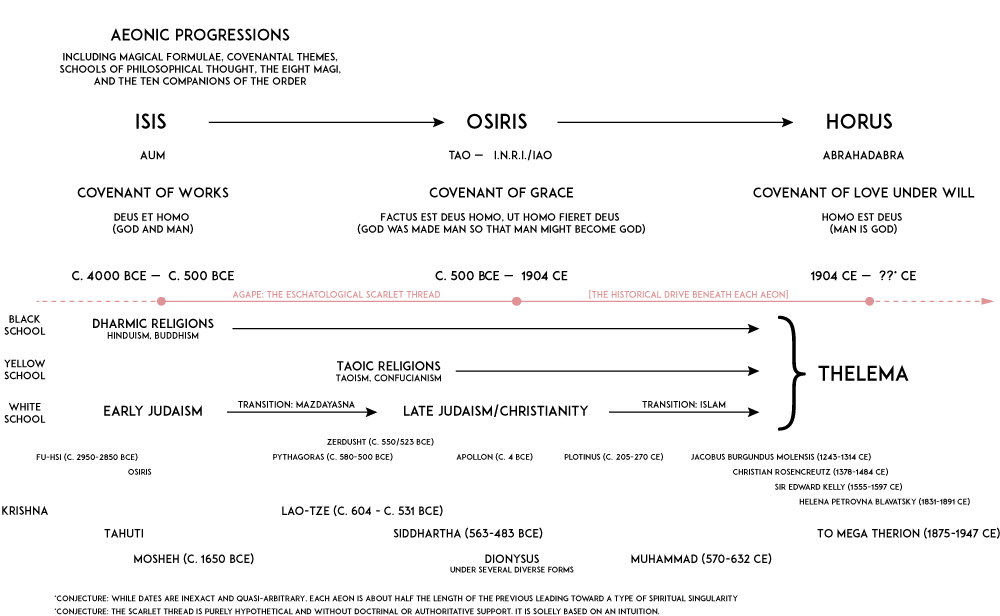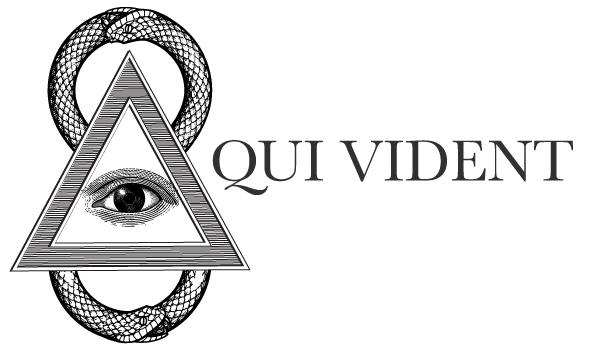Aeonic Theory
Aeonic (Covenant) Theory/Theology
Aeonic Theory is a complicated yet not entirely insignificant aspect of Thelema. Crowley's approach and application is entirely flawed even if his premise is fairly understandable. This particular diagram is a brief overview of one approach (that also has its share of flaws), but it will require further elucidation at a later date.

Many, if not most, are caught up in looking at what they think are Crowley’s view of the Aeons that they don’t examine what Crowley’s view of what Aeons really are and aren’t. He didn’t have much of a concrete view of the Aeons. He made a couple of comments here and there, usually vauge comments, nearly always scientifically unsupported comments. He didn’t really have any theory that was conclusively laid out beyond his simplistic ‹mother, father, child› motif and Fichtean dialectic. In fact, he made very limited comments about some astrological associations but didn’t even really flesh those out all that much.
There is a current trend of Thelemic authors, I believe influenced by a [now deceased] popular author of late, who continue this fallacy that Fichtean dialectic is the same as Hegelan dialectic. It’s not. It appears as such on the surface but only as such to those who haven’t dug far enough into Hegel to truly understand his method. Those looking for the standard thesis, antithesis, synthesis pattern that has been around since Aristotle will be disappointed. But this is the assumption of many because it fits the Thelemic narrative necessary to perpetuate the Crowleyan aeonic bullshit that he picked up from his Darby-influenced upbringing and to continue the dispensationalist nonsense of a specific branch of A∴A∴
That said, I’ve claimed in the past that I believe Crowley’s aeons to be accurate, just not entirely in the manner Crowley laid out. I think he was onto something but didn’t quite have the resources to explain it and was too highly influenced by his Plymouth Brethren upbringing to express it in anything other than the Darby-grounded dispensationalism of his day. That doesn’t make him wrong—except the pseudo-scientific bullshit in which he wrapped up some of his explanations—so much as it made him limited in vocabulary. Nothing wrong with that. We just don’t have to remain limited.
In understanding the nature of the Aeons—that symbolism that expresses the progress of humanity through history in a meta-narrative of evolutionary promise—we find the unfolding nature of ourselves as well. This is not a fantasy of occult power and Adepthood, but the birthright and the raison d'etre of every man and every woman. Just as our current situation of humanity is far from the end of the narrative, this New Aeon is merely the next step in a cascade of involution on a scale that is rapidly and progressively expanding through the soul of humanity. We will, eventually, become the Old Aeon. It's important to keep that in mind. However, to pine away at what we might become in the distant future, rather than to recognize what we have been and focus on what we are becoming here and now, is the idiot's chase of the phantasmal.
The aeons are the scaffolding of a system of interpretation. The manner in which we approach aeonic theory is crucial to how we come to understand the unfolding of the Law of Thelema now through the lens of aeonic progression from the past to the present and into the future. They are a part of our eschatological framework and system of developmental theory.
The ahistoric, astrological approach to the aeons leaves us with no instructional material of worth beyond a small cultic nuance with limited application. Pulling back the curtain on human civilization and individual development allows us to see everything is connected, and the creative emergence of consciousness at all levels, all structures, all stages removes a nuanced doctrine of the aeons and offers a full-fledged understanding of the unfolding of history and humanity’s place in it.
- Aeon of Isis
- Aeon of Osiris
- Aeon of Horus
I recently read a political reframing of the "New Aeon" as a resistant and destructive force in the aim of social progress. While not entirely the same blindness I believe Crowley had in his lifetime, I think it’s close. It’s the idea that all this smashing and stomping around in the new aeon means a tumultuous end of "life as we knew it" for hundreds and thousands of years, that somehow social chaos is a magical formula of the inauguration of the Aeon of the Child (or any aeon, for that matter).
The Aeon of Horus isn’t about "destroying the old" anymore than the previous "New Aeon" was about destroying the so-called Aeon of Isis. It not at all about the "old" needing to die before the "new" can begin. I realise it’s a neat mythic narrative, but it’s just another superficial approach to examining the unfolding of humanity through time. It’s nice to think that we are suddenly in this enlightened zone of something new, that the past pathologies are all under tumultuous siege and dying away by force and fire. That’s not entirely reality as we know it. That’s not the truth of the human condition. As each new aeon appears to resolve certain pathologies of critical mass, it also introduces new pathologies (even if we’re not entirely sure what those are immediately). The whole point of the aeons seen in the perspective of a dialectic rather than a dispensation is that we can observe the actual flow of history through this series of unfoldings and the nature of the internal conflict of one aeon giving way to its resolution in the next aeon.
"Social progress," as such, is not the goal of any aeon. It’s not even really the prime mover of an aeon. For instance, civil rights is a by-product of the cultural move of critical mass toward individualisation. It is only by starting to recognise the inherent, metaphysical distinction of the individual that we can start to recognise the political equality of and within specific groups and, indeed, society as a whole.
Attribution
No part of this publication may be used or redistributed for any purpose without the express prior written consent of the author.
Canons of Thelemic Philosophy & Religion © 1996-2024 by Qui Vident.

Comments
If you wish to comment about the materials here, feedback is welcome. Feel free to email questions, comments, and concerns regarding the Canons to curate@quivident.co.